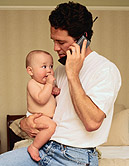
WEDNESDAY, Jan. 12 (HealthDay News) — Even though they can’t talk yet, babies just over a year old understand many spoken words and use the same brain structures as adults to process them, according to a new study.
The findings challenge the widely held belief that infants might use an entirely different mechanism than adults for learning words, and that this ability begins primitively and evolves into the process used by adults.
Researchers used noninvasive brain scans to assess brain activity in infants aged 12 months to 18 months as they listened to words.
The researchers paired words with pictures, some matching the spoken words and others that had no relation to them. Among other things, the babies saw a picture of a ball followed by the spoken word “ball,” as well as a picture of a ball followed by the spoken word “dog.”
The mismatched words provoked a strong reaction in the same section of the brain (the left frontotemporal areas) related to word processing in the adult brain.
“Babies are using the same brain mechanisms as adults to access the meaning of words from what is thought to be a mental ‘database’ of meanings, a database which is continually being updated right into adulthood,” first author Katherine E. Travis, of the department of neurosciences and the Multimodal Imaging Laboratory at the University of California, San Diego (UCSD), said in a UCSD news release.
“Our study shows that the neural machinery used by adults to understand words is already functional when words are first being learned,” co-author Eric Halgren, a professor of radiology, said in the news release. “This basic process seems to embody the process whereby words are understood, as well as the context for learning new words.”
The findings could lead to the development of tests to screen infants for language disabilities or autism.
The study was published in the Jan. 5 online edition of the journal Cerebral Cortex.
More information
The American Speech-Language-Hearing Association has more about speech and language development.

